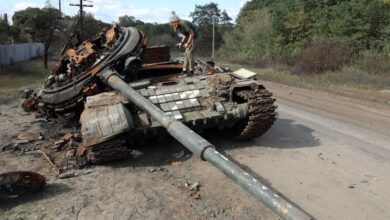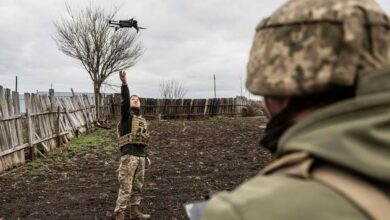Mahdi orders full integration of Shia militias into Iraq’s armed forces
Iraq’s Prime Minister Adil Abdul Mahdi issued a decree this week ordering the country’s Shia Hashd al-Shaabi, or Popular Mobilization Units, militias to choose between full integration into the Iraqi armed forces or disarmament.
“In accordance with the requirements of the public defense, and based on the powers granted to us by the constitution … All forces of the Popular Mobilization Units are to operate as an inseparable part of the Armed Forces and are subject to the same regulations applied to those Armed Forces,” the July 1 decree read.
The order requires PMU factions to close all headquarters and financial offices, replace their militia names with official military designations such as “division, brigade or battalion” and to sever all political affiliations in accordance with the Iraqi constitution.
Monday’s decree is Mahdi’s latest attempt at gaining influence over the Iran-backed militias, which boast more than 120,000 fighters.
The PMUs, also called Popular Mobilization Forces, nominally fall under Mahdi’s authority as the general commander of Iraq’s armed forces since former Prime Minister Haider al-Abadi formerly folded them into the regular military in May 2018. Baghdad then granted their fighters salaries equal to those of the Iraqi Army later that year.
On the ground, however, the militias are largely influenced by local commanders and deputy head of the PMU office Abu Mahdi al-Muhandis, the former head of Kata’ib Hezbollah who the U.S. government considers a terrorist linked to Iran’s Islamic Revolutionary Guard Corps.
The PMUs have insulated themselves from Baghdad’s authority by wresting control of local energy industries, smuggling routes and real estate markets. Some factions have been accused of organized criminal activity and war crimes against Sunni populations.
Iraq’s interior ministry has struggled to disrupt activities of the militias, which have managed to secure some political and legislative cover, including from some Iraqi officials who see them as an indispensable pillar of security.
The PMUs also enjoy wide support among Iraq’s population for their role in fighting Islamic State after the partial collapse of the Iraqi Army in 2014.
Monday’s decree is also part of a broad new national security plan directed by the prime minister’s office to move the PMUs out of Iraq’s cities, according to Michael Knights, a senior fellow at the Washington Institute for Near East Policy.
The model, which has been undergoing revision for months and discussed at length with Iraq’s international partners, calls for PMUs to withdraw from majority-Sunni areas; the Iraqi Army to withdraw from the Iraqi cities and assume responsibility for rural security; and the Federal Police to take up security in Iraq’s urban areas, according to Knights, who met with Iraqi defense and political officials in Baghdad last week.
The decision has “nothing to do with drone attacks or the Houthi rebels” Iran is accused of arming in Yemen, Knights said, but is part of a broader effort drafted after “extensive discussion with Iraq’s international partners.”
The Trump administration last week said that a recent drone attack on a Saudi Arabian oil pipeline was staged from Iraq, and has blamed PMUs for a rocket that landed near the U.S. embassy in Baghdad in May.
Unlike the Obama administration, which saw the PMUs as necessary players in the fight against ISIS, the Trump administration views the militias as an arm of the IRGC and a growing threat to Iraq’s sectarian and state stability.
The Trump administration has applied a “maximum pressure” strategy to get Iran to renegotiate the 2015 nuclear deal and curb its activities in the region.
The U.S. has also accused the PMUs of facilitating the transport of Iranian weapons systems across the Syrian border, posing a threat to Israel.
The State Department called for the PMUs to be disbanded as recently as last year.
Deputy Assistant Secretary of State for Iraq and Iran Andrew Peek publicly warned the Iraqi government earlier this year that international reconstruction aid for Iraq “will not be there forever” and is “dependent on the choices of the Iraqi government” with regards to the PMUs.
“We cannot expect internally displaced peoples to return … to areas where there are armed gangs running around,” Peek said in Iraqi Kurdistan in February.
More recently, the Trump administration has been showing signs of a more pragmatic approach to the militias, Knights said.
Mahdi’s reforms “won’t be transformative overnight,” Knights said. The prime minister’s office and even Hashd militias themselves have limited leverage over some of the more powerful actors, and enforcing reforms would fall on units within the PMUs themselves.
“The Hashd is policing itself right now, and that has not really been working,” Knights said.
Still, he said, the plan shows promise. “The Iraqis are exercising command and control.”
One of the first tests of this model will be an effort in the coming days to reduce PMU presence in the Nineveh plains, an area with significant Iraqi Christian population that has been a political focus of U.S. Vice President Mike Pence, Knights said.
PMU commanders may also have an interest in doing away with names such as Kata’ib Hezbollah and Asa’ib Ahl al-Haqq, Knights said.
The move could distance the militias’ from future association with nefarious activities and the IRGC in the interest of preserving popular legitimacy.












